2016年6月大学英语四六级改革解读崔万龙参考
- 格式:pdf
- 大小:503.31 KB
- 文档页数:13
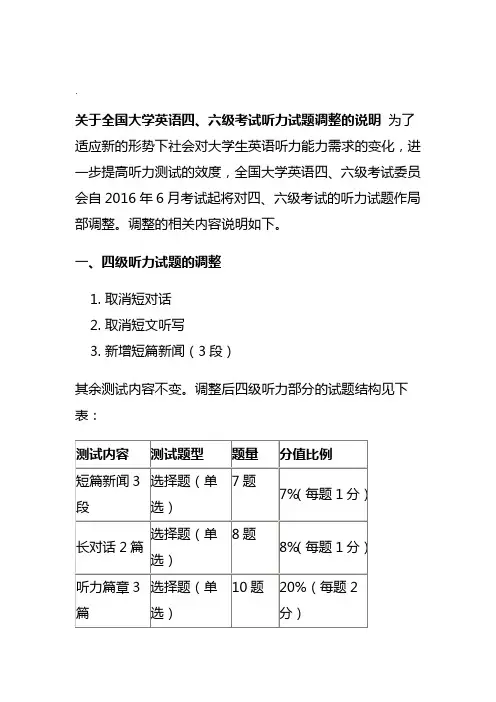
关于全国大学英语四、六级考试听力试题调整的说明为了适应新的形势下社会对大学生英语听力能力需求的变化,进一步提高听力测试的效度,全国大学英语四、六级考试委员会自2016年6月考试起将对四、六级考试的听力试题作局部调整。
调整的相关内容说明如下。
一、四级听力试题的调整1.取消短对话2.取消短文听写3.新增短篇新闻(3段)其余测试内容不变。
调整后四级听力部分的试题结构见下表:测试内容测试题型题量分值比例短篇新闻3段选择题(单选)7题7%(每题1分)长对话2篇选择题(单选)8题8%(每题1分)听力篇章3篇选择题(单选)10题20%(每题2分)二、六级听力试题的调整1.取消短对话2.取消短文听写3.听力篇章调整为2篇(原3篇)4.新增讲座/讲话(3篇)其他测试内容不变。
调整后六级听力部分的试题结构见下表:1.把握脉络主旨新闻听力题型有少量题目是考查新闻主旨的,且题目形式一样相对固定(例如:What did the speaker want to tell us in this passage / What is the speaker mainly talking about / What is the passage mainly about)。
主旨类题型尽管显现的频率并非高,但明白得大意是明白得细节和准确推断的前提,建议大伙儿在练习听任何一篇材料时,第一问自己一个问题:这篇文章要紧在讲什么2.把握六个要素一篇标准的新闻报导,必需包括六大要素,可归纳为“5个W”和“1个H”:when(新闻发生时刻)、where(新闻发生地址)、who(新闻涉及人物)、what(新闻事件)、why(新闻发生的缘故)、how(新闻事件的背景、如何促成这一事件、后续情形如何等)。
新闻的六个要素是常设的考点,听新闻时注意把握以上六个要素,即可轻松理出头绪。
3.重视新闻首句新闻首句俗称“新闻导语”,是对整个报导的浓缩和归纳。
新闻导语通常包括多个新闻要素,听懂了新闻导语,也就明白了新闻的要紧内容。
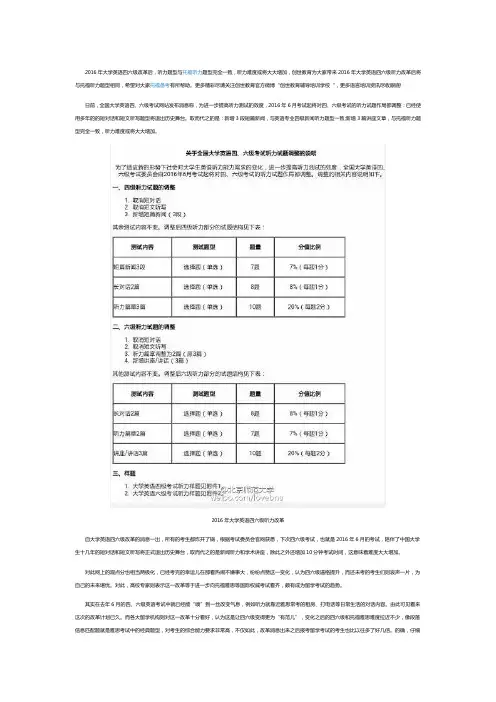
2016年大学英语四六级改革后,听力题型与托福听力题型完全一致,听力难度或将大大增加,创世教育为大家带来2016年大学英语四六级听力改革后将与托福听力题型相同,希望对大家托福备考有所帮助。
更多精彩尽请关注创世教育官方微博“创世教育辅导培训学校“,更多语言培训资讯尽收眼底!日前,全国大学英语四、六级考试网站发布消息称,为进一步提高听力测试的效度,2016年6月考试起将对四、六级考试的听力试题作局部调整:已经使用多年的的短对话和短文听写题型将退出历史舞台。
取而代之的是:新增3段短篇新闻,与英语专业四级新闻听力题型一致;新增3篇讲座文章,与托福听力题型完全一致,听力难度或将大大增加。
2016年大学英语四六级听力改革自大学英语四六级改革的消息一出,所有的考生都炸开了锅,根据考试委员会官网获悉,下次四六级考试,也就是2016年6月的考试,陪伴了中国大学生十几年的短对话和短文听写将正式退出历史舞台,取而代之的是新闻听力和学术讲座,除此之外还增加10分钟考试时间,这意味着难度大大增加。
对此网上的观点分也相当两极化,已经考完的幸运儿在那看热闹不嫌事大,纷纷点赞这一变化,认为四六级逼格提升,而还未考的考生们则哀声一片,为自己的未来堪忧。
对此,高校专家则表示这一改革等于进一步向托福雅思等国际权威考试看齐,颇有成为留学考试的趋势。
其实在去年6月的四、六级英语考试中就已经能“嗅”到一丝改变气息,例如听力就靠近雅思常考的租房、打电话等日常生活的对话内容。
由此可见看来这次的改革计划已久。
而各大留学机构则对这一改革十分看好,认为这是让四六级变得更为“有范儿”,变化之后的四六级和托福雅思难度拉近不少,像段落信息匹配题就是雅思考试中的经典题型,对考生的综合能力要求非常高,不仅如此,改革消息出来之后报考留学考试的考生也比以往多了好几倍。
的确,仔细一想,托福雅思无论从作用、水平、认可度乃至逼格上都比四六级高许多,既然两者难度相差不大,那为何不考托福雅思?不过别高兴的太早,别忘了四级可是大学毕业必备的考试之一,倘若今年没过的话,明年又将出什么幺蛾子呢?这样一想,留学党们可要偷着乐了。
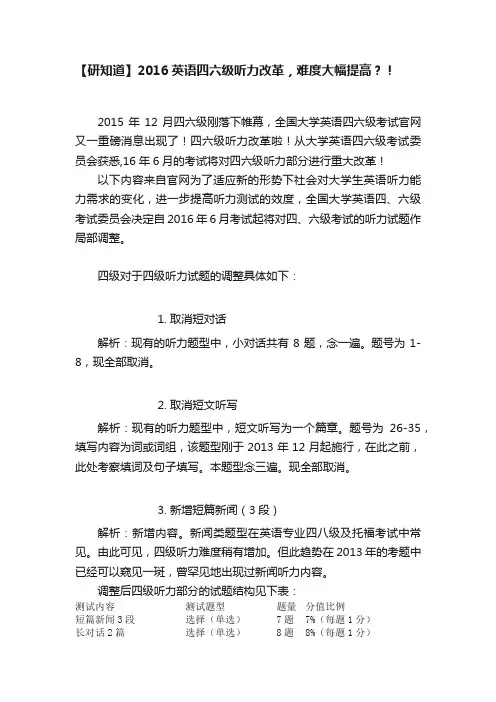
【研知道】2016英语四六级听力改革,难度大幅提高?!2015年12月四六级刚落下帷幕,全国大学英语四六级考试官网又一重磅消息出现了!四六级听力改革啦!从大学英语四六级考试委员会获悉,16年6月的考试将对四六级听力部分进行重大改革!以下内容来自官网为了适应新的形势下社会对大学生英语听力能力需求的变化,进一步提高听力测试的效度,全国大学英语四、六级考试委员会决定自2016年6月考试起将对四、六级考试的听力试题作局部调整。
四级对于四级听力试题的调整具体如下:1. 取消短对话解析:现有的听力题型中,小对话共有8题,念一遍。
题号为1-8,现全部取消。
2. 取消短文听写解析:现有的听力题型中,短文听写为一个篇章。
题号为26-35,填写内容为词或词组,该题型刚于2013年12月起施行,在此之前,此处考察填词及句子填写。
本题型念三遍。
现全部取消。
3. 新增短篇新闻(3段)解析:新增内容。
新闻类题型在英语专业四八级及托福考试中常见。
由此可见,四级听力难度稍有增加。
但此趋势在2013年的考题中已经可以窥见一斑,曾罕见地出现过新闻听力内容。
调整后四级听力部分的试题结构见下表:测试内容测试题型题量分值比例短篇新闻3段选择(单选)7题7%(每题1分)长对话2篇选择(单选)8题8%(每题1分)听力篇章3篇选择(单选)10题20%(每题2分)六级六级听力试题的调整:1、取消短对话解析:同四级一样,现有的听力题型中,小对话共有8题,念一遍。
题号为1-8,现全部取消。
2、取消短文听写解析:同四级一样,现有的听力题型中,短文听写为一个篇章。
题号为26-35,填写内容为词或词组,该题型刚于2013年12月起施行,在此之前,此处考察填词及句子填写。
本题型念3遍。
现全部取消。
3、听力篇章调整为2篇(原3篇)解析:现有题型,删除一篇。
念一遍。
4、新增讲座/讲话(3篇)解析:此内容模仿英语专业八级第一题。
但此处为三篇讲座或讲话。
新增题型。
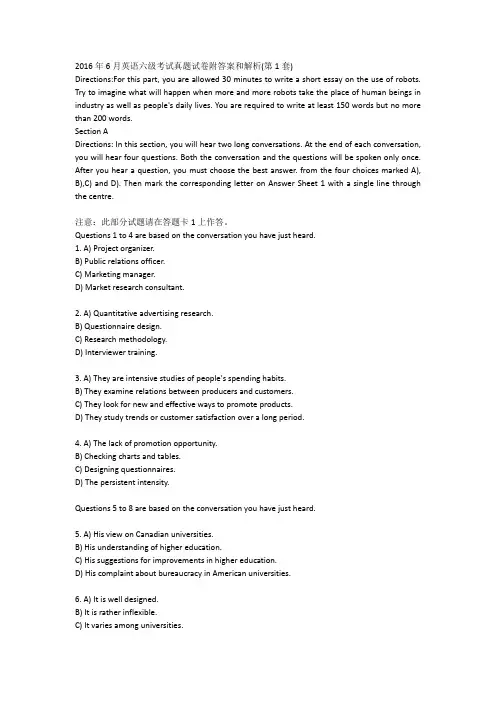
2016年6月英语六级考试真题试卷附答案和解析(第1套)Directions:For this part, you are allowed 30 minutes to write a short essay on the use of robots. Try to imagine what will happen when more and more robots take the place of human beings in industry as well as people's daily lives. You are required to write at least 150 words but no more than 200 words.Section ADirections: In this section, you will hear two long conversations. At the end of each conversation, you will hear four questions. Both the conversation and the questions will be spoken only once. After you hear a question, you must choose the best answer. from the four choices marked A), B),C) and D). Then mark the corresponding letter on Answer Sheet 1 with a single line through the centre.注意:此部分试题请在答题卡1上作答。
Questions 1 to 4 are based on the conversation you have just heard.1. A) Project organizer.B) Public relations officer.C) Marketing manager.D) Market research consultant.2. A) Quantitative advertising research.B) Questionnaire design.C) Research methodology.D) Interviewer training.3. A) They are intensive studies of people's spending habits.B) They examine relations between producers and customers.C) They look for new and effective ways to promote products.D) They study trends or customer satisfaction over a long period.4. A) The lack of promotion opportunity.B) Checking charts and tables.C) Designing questionnaires.D) The persistent intensity.Questions 5 to 8 are based on the conversation you have just heard.5. A) His view on Canadian universities.B) His understanding of higher education.C) His suggestions for improvements in higher education.D) His complaint about bureaucracy in American universities.6. A) It is well designed.B) It is rather inflexible.C) It varies among universities.D) It has undergone great changes.7. A) The United States and Canada can learn from each other.B) Public universities are often superior to private universities.C) Everyone should be given equal access to higher education.D) Private schools work more efficiently than public institutions.8. A) University systems vary from country to country.B) Efficiency is essential to university management.C) It is hard to say which is better, a public university or a private one.D) Many private university in the U.S. are actually large bureaucracies.Directions: In this section, you will hear two passages. At the end of each passage, you will hear three or four questions. Both the passage and the questions will be spoken only once. After you hear a question, you must choose the best answer from the four choices marked A), B), C) and D). Then mark the corresponding letter on Answer Sheet 1 with a single line through the centre.Passage OneQuestions 9 to 11 are based on the passage you have just heard.9. A) Government's role in resolving an economic crisis.B) The worsening real wage situation around the world.C) Indications of economic recovery in the United States.D) The impact of the current economic crisis on peopled life.10. A) They will feel less pressure to raise employees' wages.B) They will feel free to choose the most suitable employees.C) They will feel inclined to expand their business operations.D) They will feel more confident in competing with their rivals.11. A) Employees and companies cooperate to pull through the economic crisis.B) Government and companies join hands to create jobs for the unemployed.C) Employees work shorter hours to avoid layoffs.D) Team work will be encouraged in companies.Passage TwoQuestions 12 to 15 are based on the passage you have just heard.12. A) Whether memory supplements work.B) Whether herbal medicine works wonders.C) Whether exercise enhances one's memory.D) Whether a magic memory promises success.13. A) They help the elderly more than the young.B) They are beneficial in one way or another.C) They generally do not have side effects.D)They are not based on real science.14. A) They are available at most country fairs.B) They are taken in relatively high dosage.C) They are collected or grown by farmers.D) They are prescribed by trained practitioners.15. A) They have often proved to be as helpful as doing mental exercise.B) Taking them with other medications might entail unnecessary risks.C) Their effect lasts only a short time.D) Many have benefited from them.Section CDirections: In this section, you will hear three recordings of lectures or talks followed by three or four questions. The recordings will be played only once. After you hear a question, you must choose the best answer from the four choices marked A),B),C) and D). Then mark the corresponding letter on Answer Sheet 1 with a single line through the centre.Recording OneQuestions 16 to 18 are based on the recording you have just heard.16. A) How catastrophic natural disasters turn out to be to developing nations.B) How the World Meteorological Organization studies natural disasters.C) How powerless humans appear to be in face of natural disasters.D) How the negative impacts of natural disasters can be reduced.17. A) By training rescue teams for emergencies.B) By taking steps to prepare people for them.C) By changing people's views of nature.D) By relocating people to safer places.18. A) How preventive action can reduce the loss of life.B) How courageous Cubans are in face of disasters.C) How Cubans suffer from tropical storms.D) How destructive tropical storms can be.Recording TwoQuestions 19 to 22 are based on the recording you have just heard.19. A) Pay back their loans to the American government.B) Provide loans to those in severe financial difficulty.C) Contribute more to the goal of a wider recovery.D) Speed up their recovery from the housing bubble.20. A) Some banks may have to merge with others.B) Many smaller regional banks are going to fail.C) It will be hard for banks to provide more loans.D) Many banks will have to lay off some employees.21. A) It will work closely with the government.B) It will endeavor to write off bad loans.C) It will try to lower the interest rate.D) It will try to provide more loans.22. A) It won't help the American economy to turn around.B) It won't do any good to the major commercial banks.C) It will win the approval of the Obama administration.D) It will be necessary if the economy starts to shrink again.Recording ThreeQuestions 23 to 25 are based on the recording you have just heard.23. A) Being unable to learn new things.B) Being rather slow to make changes.C) Losing temper more and more often.D) Losing the ability to get on with others.24. A) Cognitive stimulation.B) Community activity.C) Balanced diet.D) Fresh air.25. A) Ignoring the signs and symptoms of aging.B) Adopting an optimistic attitude towards life.C) Endeavoring to give up unhealthy lifestyles.D) Seeking advice from doctors from time to time.Section ADirections: In this section, there is a passage with ten blanks. You are required to select one word for each blank from a list of choices given in a word bank following the passage. Read the passage through carefully before making your choices. Each choice in the bank is identified by a letter. Please mark the corresponding letter for each item on ,Answer Street 2 with a single line through the centre. You may not use any of the words in the bank more than once.Questions 26 to 35 are based on the following passage.Let's say you love roller-skating. Just the thought of __26__ on your roller-skates brings a smile to your face. You also know that roller-skating is excellent exercise. You have a __27__ attitude toward it.This description of roller-skating __28__ the three components of an attitude: affect, cognition, and behavior. You love the activity; it's great fun. These feelings __29__ the affective or emotional component; they are an important ingredient in attitudes. The knowledge we have about the object constitutes the cognitive component of an attitude. You understand the health __30__ that the activity can bring. Finally, attitudes have a behavioral component. Our attitudes __31__ us to go outside to enjoy roller-skating.Now, we don't want to leave you with the __32__ that these three components always work together __33__ . They don't; sometimes they clash. For example, let's say you love pizza (affective component); however, you have high cholesterol and understand (knowledge component) that eating pizza may be bad for your health. Which behavior will your attitude result in, eating pizza or __34__ it? The answer depends on which component happens to be stronger. If you are walking past a pizza restaurant at lunchtime, your emotions and feelings probably will be stronger than your knowledge that pizza may not be the best food for your health. In that instance, you have pizza for lunch. If you are at home trying to decide where to go for dinner, however, the knowledge component may __35__ , and you decide to go where you can eat a healthier meal.A.avoidingB.benefitsC.highlightD.illustratesE.impressionF.improvesG.inquiringH.perfectlyI.positiveJ.prevailK.primarilyL.promptM.specificationsN.strappingO.typicalSection BDirections: In this section, you are going to read a passage with ten statements attached to it. Each statement contains information given in one of the paragraphs. Identify the paragraph from which the information is derived. You may choose a paragraph more than once. Each paragraph is marked with a letter. Answer the questions by marking the corresponding letter on Answer Sheet 2.The Changing Generation[A] It turns out today's teenagers aren't so scary after all. Results of USA WEEKEND'S Teens & Parents survey reveal a generation of young people who get along well with their parents and approve of the way they're being raised. They think of their parents with affection and respect. They speak with Mom or Dad when they have a problem. Most feel that their parents understand them, and they believe their family is the No. 1 priority in their parents, lives. Many even think their parents are cool! Although more than a third have an object in their rooms they would like to keep secret from their parents, rarely is it anything more alarming than a diary or off-color (低俗的) book or CD.[B] Such results may seem surprising against the background of shocking incidents that color the way the mass media portray the young. In October 2000, , the same month the survey was taken, the Washington-based Center for Media and Public Affairs wrote in its publication Media Monitor that, in a recent month of TV news coverage of American youth, just 2% of teens were shown at home, and just 1% were portrayed in a work setting. In contrast, the criminal justice system accounted for nearly one out of every five visual backgrounds. No wonder parents worry their own kids might spin out of control once they hit the turbulent waters of adolescence.[C] The overall facts ought to reassure us. The survey shows us that today's teens are affectionate, sensible and far happier than the angry and tortured souls that have been painted for us by stereotypes. From other sources, we also know teenage crime, drug abuse and premarital sex are in general decline. We, of course, need to pay attention to youngsters who are filled with discontent and hostility, but we should not allow these extreme cases to distort our view of most young people.[D] My own research at the Stanford Center on Adolescence uses in-depth interviews with small samples of youngsters rather than large-scale surveys. Still, in my studies and others I have read, I find the same patterns as in USA WEEKEND'S survey. Today's teenagers admire their parents and welcome parental guidance about important matters such as career choice—though certainly not Mom and Dad's advice on matters of personal taste, such as music or fashion. When we ask teens to choose a hero,they usually select an older family member rather than a remote public figure. Most teens say they enjoy the company of both parents and friends.[E] Contrary to some stereotypes, most adolescents believe they must be tolerant of differences among individuals (though they do not always find this easy in the cliquish (拉帮结派的) environment of high school). Many of them volunteer for community service with disadvantaged people. One prevalent quality we have found in teens, statements about themselves, their friends and their families is a strikingly positive emotional tone. By and large, these are very nice kids, and as the band The Who used to sing, "The kids are alright."[F] How much is today's spirit of harmony a change from our more turbulent past? A mere generation ago, parent-child relations were described as "the generation gap". Yet even then reports of widespread youth rebellion were overdone: Most kids in the '60s and 70s shared their parents, basic values. Still, it is true that American families are growing closer at the dawn of this new millennium (千年). Perhaps there is less to fight about, with the country in a period of tranquility and the dangers of drug abuse and other unwholesome behavior well known. Perhaps in the face of impersonal and intimidating globalization, a young person's family feels more like a friendly haven than an oppressive trap. And perhaps parents are acting more like parents than in the recent past. Within just the past five years, I have noticed parents returning to a belief that teenagers need the guidance of elders rather than the liberal, "anything goes" mode of child-rearing that became popular in the second half of the 20th century.[G] But missing from all these data is the sense that today's young care very much about their country, about the broader civic and political environment, or about the future of their society. They seem to be turning inward—generally in a pro-social manner, certainly with positive benefits for intimate relationships, but too often at the expense of a connection with the present and future world beyond, including the society they will one day inherit.[H] Recently, we examined more than 400 essays on the "laws of life" that teens from two communities had written as part of an educational program initiated by the John Templeton Foundation in Radnor, Pa. In those essays, and in follow-up interviews with a few of the teenagers, we found lots of insight, positive feeling and inspirational thinking. But we also found little interest in civic life beyond the tight circles of their family and immediate friends.[I] For example, only one boy said he would like to be president when he grows up. When I was in high school, dozens in my class alone would have answered differently. In fact, other recent studies have found there has never been a time in American history when so small a proportion of young people have sought or accepted leadership roles in local civic organizations. It is also troubling that voting rates among our youngest eligible voters—18-to 24-year-olds—are way down: Little more than one in four now go to the polls, even in national elections, compared with almost twice that many when 18-year-olds were first given the vote.[J] In our interviews, many students viewed politics with suspicion and distaste. " Most politicians are kind of crooked (不诚实的)" one student declared. Another, discussing national politics, said, “I feel like one person can't do that much, and I get the impression most people don't think a group of people can do that much." Asked what they would like to change in the world, the students mentioned only personal concerns such as slowing down the pace of life, gaining good friends, becoming more spiritual, becoming either more materially successful or less materially oriented (depending on the student's values), and being more respectful of the Earth, animals and other people. One boy said, "I'd rather be concentrating on artistic efforts than saving the world or something."[K] It is fine and healthy for teens to cultivate their personal interests, and it is good news when young people enjoy harmonious relations with their family and friends. But there is also a place in a young life for noble purposes that include a dedication to the broader society, a love of country and an aspiration to make their own leadership contributions.[L] In the past, the young have eagerly participated in national service and civic affairs, often with lots of energy and idealism. If this is not happening today, we should ask why. Our society needs the full participation of its younger citizens if it is to continue to thrive. We know the promise isthere—this is a well-grounded, talented, warm-hearted group of youngsters. We have everything to gain by encouraging them to explore the world beyond their immediate experience and to prepare themselves for their turn at shaping that world.注意:此部分试题请在答题卡2上作答。
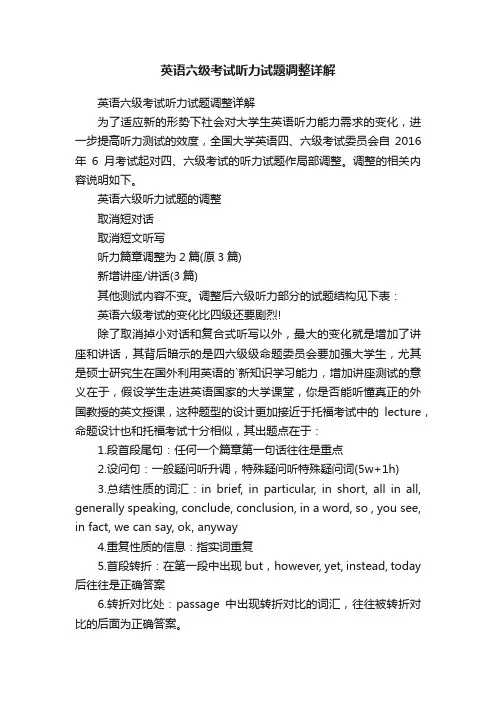
英语六级考试听力试题调整详解英语六级考试听力试题调整详解为了适应新的形势下社会对大学生英语听力能力需求的变化,进一步提高听力测试的效度,全国大学英语四、六级考试委员会自2016年6月考试起对四、六级考试的听力试题作局部调整。
调整的相关内容说明如下。
英语六级听力试题的调整取消短对话取消短文听写听力篇章调整为2篇(原3篇)新增讲座/讲话(3篇)其他测试内容不变。
调整后六级听力部分的试题结构见下表:英语六级考试的变化比四级还要剧烈!除了取消掉小对话和复合式听写以外,最大的变化就是增加了讲座和讲话,其背后暗示的是四六级级命题委员会要加强大学生,尤其是硕士研究生在国外利用英语的`新知识学习能力,增加讲座测试的意义在于,假设学生走进英语国家的大学课堂,你是否能听懂真正的外国教授的英文授课,这种题型的设计更加接近于托福考试中的lecture,命题设计也和托福考试十分相似,其出题点在于:1.段首段尾句:任何一个篇章第一句话往往是重点2.设问句:一般疑问听升调,特殊疑问听特殊疑问词(5w+1h)3.总结性质的词汇:in brief, in particular, in short, all in all, generally speaking, conclude, conclusion, in a word, so , you see, in fact, we can say, ok, anyway4.重复性质的信息:指实词重复5.首段转折:在第一段中出现but,however, yet, instead, today 后往往是正确答案6.转折对比处:passage中出现转折对比的词汇,往往被转折对比的后面为正确答案。
Although, though, even though, despite, in spite of, however, but, yet, well, not…but…, instead, on the other hand, unexpected, unexpectedly, unfortunately, fortunately7.因果关系:重因轻果because, cause, for, as, since, be due to, lead to, result from, result in, as a result8.定义处:something can be defined as something, that is so called, we call it... the definition of ... is...9.强调处:语气强硬的词汇,形容词,副词最高级10.特殊修辞:排比处、举例处、比喻处本次四六级听力改革是挑战也是机遇,当大家同时遇到新的挑战时,胜者总是那些能够迅速做出应对,并努力前行的人。
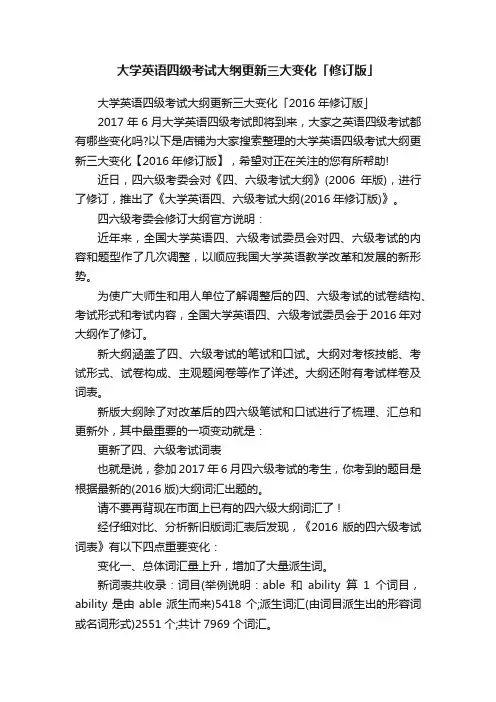
大学英语四级考试大纲更新三大变化「修订版」大学英语四级考试大纲更新三大变化「2016年修订版」2017年6月大学英语四级考试即将到来,大家之英语四级考试都有哪些变化吗?以下是店铺为大家搜索整理的大学英语四级考试大纲更新三大变化【2016年修订版】,希望对正在关注的您有所帮助!近日,四六级考委会对《四、六级考试大纲》(2006年版),进行了修订,推出了《大学英语四、六级考试大纲(2016年修订版)》。
四六级考委会修订大纲官方说明:近年来,全国大学英语四、六级考试委员会对四、六级考试的内容和题型作了几次调整,以顺应我国大学英语教学改革和发展的新形势。
为使广大师生和用人单位了解调整后的四、六级考试的试卷结构、考试形式和考试内容,全国大学英语四、六级考试委员会于2016年对大纲作了修订。
新大纲涵盖了四、六级考试的笔试和口试。
大纲对考核技能、考试形式、试卷构成、主观题阅卷等作了详述。
大纲还附有考试样卷及词表。
新版大纲除了对改革后的四六级笔试和口试进行了梳理、汇总和更新外,其中最重要的一项变动就是:更新了四、六级考试词表也就是说,参加2017年6月四六级考试的考生,你考到的题目是根据最新的(2016版)大纲词汇出题的。
请不要再背现在市面上已有的四六级大纲词汇了 !经仔细对比、分析新旧版词汇表后发现,《2016版的四六级考试词表》有以下四点重要变化:变化一、总体词汇量上升,增加了大量派生词。
新词表共收录:词目(举例说明:able和ability算1个词目,ability是由able派生而来)5418个;派生词汇(由词目派生出的形容词或名词形式)2551个;共计7969个词汇。
这些是考六级要掌握的所有词汇和词目改革后的四级要掌握6308个词汇(含派生词),4147个词目。
而根据2006年版的四、六级考试大纲,要求四级考生掌握的词汇量是4795个,六级则要求掌握6395个词汇。
也就是说,2016年新版大纲词表,四级增加了1513个词汇,六级增加了1574个词汇。
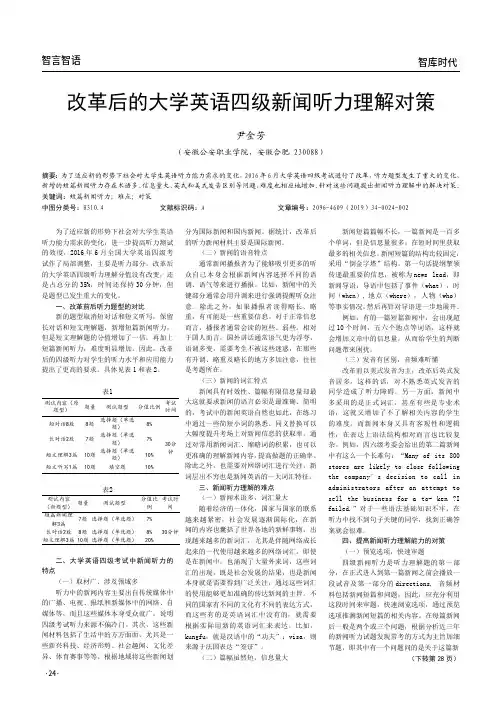
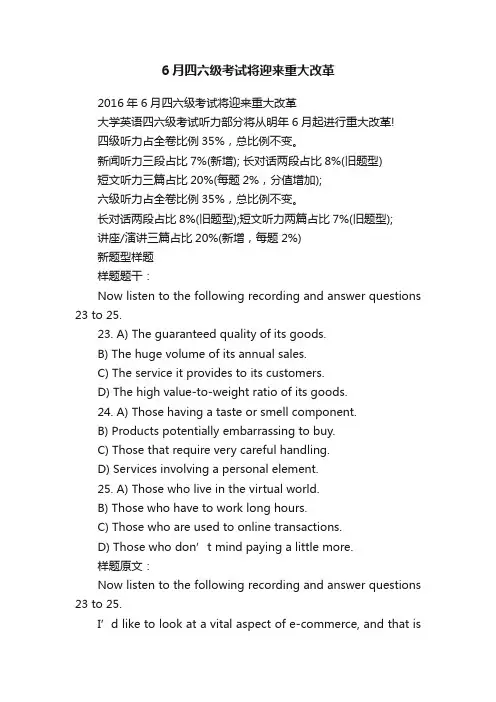
6月四六级考试将迎来重大改革2016年6月四六级考试将迎来重大改革大学英语四六级考试听力部分将从明年6月起进行重大改革!四级听力占全卷比例35%,总比例不变。
新闻听力三段占比7%(新增); 长对话两段占比8%(旧题型)短文听力三篇占比20%(每题2%,分值增加);六级听力占全卷比例35%,总比例不变。
长对话两段占比8%(旧题型);短文听力两篇占比7%(旧题型);讲座/演讲三篇占比20%(新增,每题2%)新题型样题样题题干:Now listen to the following recording and answer questions 23 to 25.23. A) The guaranteed quality of its goods.B) The huge volume of its annual sales.C) The service it provides to its customers.D) The high value-to-weight ratio of its goods.24. A) Those having a taste or smell component.B) Products potentially embarrassing to buy.C) Those that require very careful handling.D) Services involving a personal element.25. A) Those who live in the virtual world.B) Those who have to work long hours.C) Those who are used to online transactions.D) Those who don’t mind paying a little more.样题原文:Now listen to the following recording and answer questions 23 to 25.I’d like to look at a vital aspect of e-commerce, and that isthe nature of the product or service. There are certain products and services that are very suitable for selling online, and others that simply don’t work.23.Suitable products generally have a high value-to-weight ratio. Items such as CDs and DVDs are obvious examples. Books, although heavier and so more expensive to post, 23.still have a high enough value-to-weight ratio, as the success of Amazon, which started off selling only books, shows. Laptop computers are another good product for selling online.Digital products, such as software, films and music, can be sold in a purely virtual environment. The goods are paid for by online transactions, and then downloaded onto the buyer’s computer. There are no postage or delivery costs, so prices can be kept low.Many successful virtual companies provide digital services, such as financial transactions, in the case of Paypal, or means of communication, as Skype does. The key to success here is providing an easy-to-use, reliable service. Do this and you can easily become the market leader, as Skype has proved.Products which are potentially embarrassing to buy also do well in the virtual environment. Some of the most profitable e-commerce companies are those selling sex-related products or services. For a similar reason, online gambling is highly popular.24. Products which are usually considered unsuitable for selling online include those that have a taste or smell component. Food, especially fresh food, falls into this category, along with perfume. Clothes and other items that need to be tried on such as diamond rings and gold necklaces are generally not suited to virtual retailing, and, of course, items with a low value-to-weight ratio.There are exceptions, though. Online grocery shopping has really taken off, with most major supermarkets offering the service. The inconvenience of not being able to see the food you are buying is outweighed by the time saved and convenience of having the goods delivered. 25.Typical users of online supermarkets include the elderly, people who work long hours and those without their own transport.23. What is important to the success of an online store?D24. What products are unsuitable for selling online?A25. Who are more likely to buy groceries online? B其实无论题型如何改革,只要能力达到了,都不是问题。
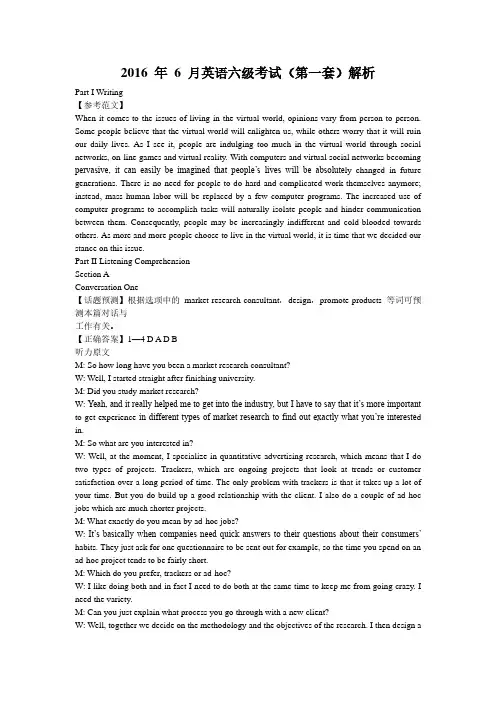
2016 年6 月英语六级考试(第一套)解析Part I Writing【参考范文】When it comes to the issues of living in the virtual world, opinions vary from person to person. Some people believe that the virtual world will enlighten us, while others worry that it will ruin our daily lives. As I see it, people are indulging too much in the virtual world through social networks, on-line games and virtual reality. With computers and virtual social networks becoming pervasive, it can easily be imagined that people’s lives will be absolute ly changed in future generations. There is no need for people to do hard and complicated work themselves anymore; instead, mass human labor will be replaced by a few computer programs. The increased use of computer programs to accomplish tasks will naturally isolate people and hinder communication between them. Consequently, people may be increasingly indifferent and cold-blooded towards others. As more and more people choose to live in the virtual world, it is time that we decided our stance on this issue.Part II Listening ComprehensionSection AConversation One【话题预测】根据选项中的market research consultant,design,promote products 等词可预测本篇对话与工作有关。

2016年英语六级成绩查询时间篇一:2016年6月英语四六级成绩查询相关事宜2016年6月英语四六级成绩查询相关事宜2016年英语四六级的考试已经在6月18日那天就结束了,想说时间过得快,那是真的。
眼看8月中旬就来了,查询成绩的时间也就要到了,具体是哪一天呢?接下来就说说关于这次四六级查分的相关事宜吧。
一、查询时间按照往年的时间,上半年的6月份的考试,成绩查询时间是在8月中旬左右。
最迟是8月中旬往后推迟,最多推迟一周。
目前官方的查询时间是啥时候还没有公布,但是大家可以用往年的时间做为参考,每年都差不多前后。
二、查询注意事项1、保管好你的准考证读完这篇文章的时候,其实离查询时间没有多久了。
请你去找找你的准考证都放在哪里了。
提前准备好准考证,因为查成绩的时候要用准考号。
以免到时候慌慌张张找不到,现在提前找好。
2、请选择官方网站查询每年都会有各式各样的窗口弹出可以查询成绩,但是,还是要提示各位小伙伴们,请认准官方网站。
3、错开高峰期查询大家都知道查成绩,查询的前几个小时是网络会繁忙的,请避开高峰期。
不要太着急,总能查到成绩。
三、查询后的相关事项当你查到成绩后,请对照自己的情况:1、考试没有通过。
同学不要过去悲伤,其实四六级考试没有你想的那么难,继续努力吧,加把劲就可以的。
2、四级通过。
这些同学可以赶紧抓紧参加12月份的六级考试的了,可以开始复习了,趁热打铁吧,一次性考完省事。
3、六级通过的同学,分为两种:低分飘过的同学,你需要考虑要不要刷分,低分的六级,确实不怎么样,只是通过了;高分通过的同学,在四六级考试上可以暂时缓冲一下了,写下来可以考虑是否需要参加雅思、托福考试等。
时间久了,不用词汇,再捡起来就不好捡起了。
英语四六级考试,对于每一位同学来说都不陌生,亲关注官方网站,注意四六级成绩的发布时间,并及时做出自己的学习规划。
不要畏惧,已经考试结束,该面对的总要面对,何况不一定是坏结果呢,或许会是好结果呢。
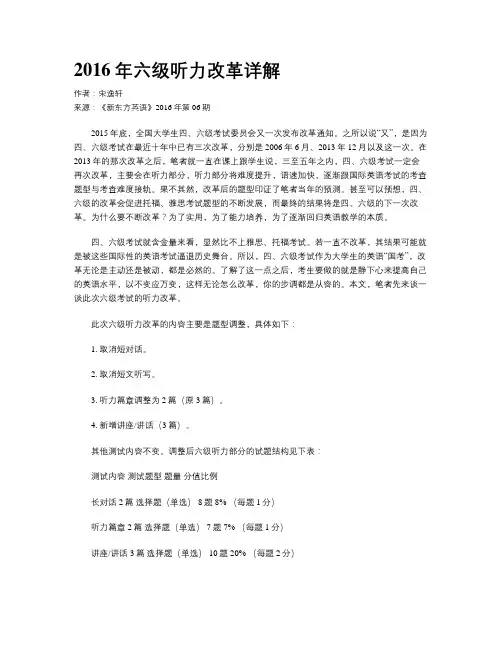
2016年六级听力改革详解作者:宋逸轩来源:《新东方英语》2016年第06期2015年底,全国大学生四、六级考试委员会又一次发布改革通知。
之所以说“又”,是因为四、六级考试在最近十年中已有三次改革,分别是2006年6月、2013年12月以及这一次。
在2013年的那次改革之后,笔者就一直在课上跟学生说,三至五年之内,四、六级考试一定会再次改革,主要会在听力部分,听力部分将难度提升,语速加快,逐渐跟国际英语考试的考查题型与考查难度接轨。
果不其然,改革后的题型印证了笔者当年的预测。
甚至可以预想,四、六级的改革会促进托福、雅思考试题型的不断发展,而最终的结果将是四、六级的下一次改革。
为什么要不断改革?为了实用,为了能力培养,为了逐渐回归英语教学的本质。
四、六级考试就含金量来看,显然比不上雅思、托福考试。
若一直不改革,其结果可能就是被这些国际性的英语考试逼退历史舞台。
所以,四、六级考试作为大学生的英语“国考”,改革无论是主动还是被动,都是必然的。
了解了这一点之后,考生要做的就是静下心来提高自己的英语水平,以不变应万变,这样无论怎么改革,你的步调都是从容的。
本文,笔者先来谈一谈此次六级考试的听力改革。
此次六级听力改革的内容主要是题型调整,具体如下:1. 取消短对话。
2. 取消短文听写。
3. 听力篇章调整为2篇(原3篇)。
4. 新增讲座/讲话(3篇)。
其他测试内容不变。
调整后六级听力部分的试题结构见下表:测试内容测试题型题量分值比例长对话2篇选择题(单选) 8题 8% (每题1分)听力篇章2篇选择题(单选) 7题 7% (每题1分)讲座/讲话3篇选择题(单选) 10题 20% (每题2分)先来看看改革前后的异同:听力部分的总分值不变;长对话2篇,和以前一样,只不过分值由7%上升为8%;听力篇章以前有3篇,分值为10%,现在减为2篇,分值随之降为7%;短对话和短文听写消失,取而代之的是3篇讲座/讲话,共10题,占20%的分值。
四六级改革符合社会发展趋势作者:周津洁李冉李姝佳来源:《商情》2016年第02期【摘要】最近,大学英语四六级官网又一次公布了一条炸裂性的消息——四六级听力,从明年6月起,改革!四六级考试从“一题多卷”变“多题多卷”,再到结构和测试题型的局部调整,再到如今的听力改革。
国家教育部高教司向我们展示了英语教育的发展趋势——逐步培养学生的英语综合应用能力,特别是听说能力,使他们在今后工作和社会交往中能用英语有效地进行口头和书面的信息交流。
【关键词】四六级英语改革四六级英语改革是历史的必然趋势。
2015年,是教育规划纲要取得显著成效的重要一年,也是教育事业全面发展,教育改革全面推进的一年。
而四六级作为对大学生的实际英语能力进行客观准确测量,为大学英语教学提供测评服务的一项大规模标准化考试,势必要做出一些举动来推动中国教育的发展。
2015年,也是中国社会进程中重要的一年,对第十三个五年进行了规划和展望。
根据议程,到2030年全球教育要实现一项总目标,即“确保为每一个人提供包容、公平、有质量的教育和终身学习机会”。
从这项政策,我们可以看出中国共产党和政府对于中国特色社会主义教育的充分重视。
我们要实现中华名族的伟大复兴,教育是重中之重,更何况是大学生的英语素质教育。
2015年,更是中国走向世界的一年,在习近平主席的带领下,中国确立了“21世纪海上丝绸之路”,这条目前中国最高的国家级顶层战略,将会带领着中国人民探寻经济增长之道、实现全球化再平衡、开创地区新型合作,这是一个纪念碑式的创新。
显然,在“一带一路”这一世纪性系统大工程中,教育具有着举足轻重的地位,发挥着基础性、全局性、先导性的作用。
从这一项项政策、经济的发展,英语改革是历史的必然,大学英语四六级作为大学英语教育中的领头羊,四六级英语的改革更是顺应了历史的趋势。
四六级改革影响最大的肯定是各个高校的大学生,大学生对于此次的改革也是各抒己见。
有人欢喜,有人愁。
觉得这次四六级改革是考试难度的提升,不利于现在高校大学生减压,但是正是这种质的飞越,给了大学生一种挑战,更是一种机会。
大学英语四级考试大纲更新三大变化「修订版」大学英语四级考试大纲更新三大变化「2016年修订版」2017年6月大学英语四级考试即将到来,大家之英语四级考试都有哪些变化吗?以下是店铺为大家搜索整理的大学英语四级考试大纲更新三大变化【2016年修订版】,希望对正在关注的您有所帮助!近日,四六级考委会对《四、六级考试大纲》(2006年版),进行了修订,推出了《大学英语四、六级考试大纲(2016年修订版)》。
四六级考委会修订大纲官方说明:近年来,全国大学英语四、六级考试委员会对四、六级考试的内容和题型作了几次调整,以顺应我国大学英语教学改革和发展的新形势。
为使广大师生和用人单位了解调整后的四、六级考试的试卷结构、考试形式和考试内容,全国大学英语四、六级考试委员会于2016年对大纲作了修订。
新大纲涵盖了四、六级考试的笔试和口试。
大纲对考核技能、考试形式、试卷构成、主观题阅卷等作了详述。
大纲还附有考试样卷及词表。
新版大纲除了对改革后的四六级笔试和口试进行了梳理、汇总和更新外,其中最重要的一项变动就是:更新了四、六级考试词表也就是说,参加2017年6月四六级考试的考生,你考到的题目是根据最新的(2016版)大纲词汇出题的。
请不要再背现在市面上已有的四六级大纲词汇了 !经仔细对比、分析新旧版词汇表后发现,《2016版的四六级考试词表》有以下四点重要变化:变化一、总体词汇量上升,增加了大量派生词。
新词表共收录:词目(举例说明:able和ability算1个词目,ability是由able派生而来)5418个;派生词汇(由词目派生出的形容词或名词形式)2551个;共计7969个词汇。
这些是考六级要掌握的所有词汇和词目改革后的四级要掌握6308个词汇(含派生词),4147个词目。
而根据2006年版的四、六级考试大纲,要求四级考生掌握的词汇量是4795个,六级则要求掌握6395个词汇。
也就是说,2016年新版大纲词表,四级增加了1513个词汇,六级增加了1574个词汇。
2016年6月新英语六级考试题型说明一、CET-6听力试题的调整1.取消短对话2.取消短文听写3.听力篇章调整为2篇(原3篇)4.新增讲座/讲话(3篇)其他测试内容不变。
调整后六级听力部分的试题结构见下表:二、CET-6试卷整体情况英语六级试卷结构、测试内容、测试题型、分值比例和考试时间如下表所示:三、CET-6考试听力样题Part II Listening Comprehension (30 minutes) Section ADirections: In this section, you will hear two long conversations. At the end of each conversation, you will hear some questions. Both the conversation and the questions will be spoken only once. After you hear a question, you must choose the best answeron Answer Sheet 1with a single line through the centre.Conversation OneQuestions 1 to 4 are based on the conversation you have just heard.1. A) He invented the refrigerator. C) He was admitted to a university.B) He patented his first invention. D) He got a degree in Mathematics.2. A) He started to work on refrigeration.B) He became a professor of Mathematics.C) He fell in love with Natasha Willoughby.D) He distinguished himself in low temperature physics.3. A) Discovering the true nature of subatomic particles.B) Their explanation of the laws of cause and effect.C) Their work on very high frequency radio waves.D) Laying the foundations of modern mathematics.4. A) To have a three-week holiday. C) To patent his inventions.B) To spend his remaining years. D) To teach at a university. Conversation TwoQuestions 5 to 8 are based on the conversation you have just heard.5. A) The injury of some students.B) A school bus crash on the way.C) The collapse of a school building.D) A fire that broke out on a school campus.6. A) Teaching. C) Having lunch.B) On vacation. D) Holding a meeting.7. A) A malfunctioning stove. C) Violation of traffic rules.B) Cigarettes butts left by workers. D) Negligence in school maintenance.8. A) Sent a story to the local newspaper.B) Threw a small Thanksgiving party.C) Baked some cookies as a present.D) Wrote a personal letter of thanks.Section BDirections:In this section, you will hear two passages. At the end of each passage, you will hear some questions. Both the passage and the questions will be spoken only once. After you hear a question, you must choose the best answer from the fourSheet 1 with a single line through the centre.Passage OneQuestions 9 to 11 are based on the passage you have just heard.9. A) It is a trait of a generous character. C) It is an indicator of high intelligence.B) It is a reflection of self-esteem. D) It is a sign of happiness and confidence.10. A) It was self-defeating. C) It was the essence of comedy.B) It was aggressive. D) It was something admirable.11. A) It is a double-edged sword. C) It is a unique gift of human beings.B) It is a feature of a given culture. D) It is a result of both nature and nurture. Passage TwoQuestions 12 to 15 are based on the passage you have just heard.12. A) She is a tourist guide. C) She is a domestic servant.B) She is an interpreter. D) She is from the royal family.13. A) It is situated at the foot of a beautiful mountain.B) It was used by the family to hold dinner parties.C) It was frequently visited by heads of state.D) It is furnished like one in a royal palace.14. A) It is elaborately decorated. C) It is very big, with only six slim legs.B) It has survived some 2,000 years. D) It is shaped like an ancient Spanish boat.15. A) They are interesting to look at.B) They have lost some of their legs.C) They do not match the oval table at all.D) They are uncomfortable to sit in for long.Section CDirections: In this section, you will hear recordings of lectures or talks followed by some questions. The recordings will be played only once. After you hear a question, you must choose the best answer from the four choices marked A), B), C) and D). Then mark the corresponding letter on Answer Sheet 1 with a single line through the centre.Now listen to the following recording and answer questions 16 to 19.16. A) They investigate the retirement homes in America.B) They are on issues facing senior citizens in America.C) They describe the great pleasures of the golden years.D) They are filled with fond memories of his grandparents.17. A) The loss of the ability to take care of himself.B) The feeling of not being important any more.C) Being unable to find a good retirement home.D) Leaving the home he had lived in for 60 years.18. A) The loss of identity and self-worth.B) Fear of being replaced or discarded.C) Freedom from pressure and worldly cares.D) The possession of wealth and high respect.19. A) The urgency of pension reform.B) Medical care for senior citizens.C) Finding meaningful roles for the elderly in society.D) The development of public facilities for senior citizens.Now listen to the following recording and answer questions 20 to 22.20. A) It seriously impacts their physical and mental development.B) It has become a problem affecting global economic growth.C) It is a common problem found in underdeveloped countries.D) It is an issue often overlooked by parents in many countries.21. A) They will live longer. C) They get along well with people.B) They get better pay. D) They develop much higher IQs.22. A) Appropriated funds to promote research of nutrient-rich foods.B) Encouraged breastfeeding for the first six months of a child’s life.C) Recruited volunteers to teach rural people about health and nutrition.D) Targeted hunger-relief programs at pregnant women and young children. Now listen to the following recording and answer questions 23 to 25.23. A) The guaranteed quality of its goods.B) The huge volume of its annual sales.C) The service it provides to its customers.D) The high value-to-weight ratio of its goods.24. A) Those having a taste or smell component.B) Products potentially embarrassing to buy.C) Those that require very careful handling.D) Services involving a personal element.25. A) Those who live in the virtual world.B) Those who have to work long hours.C) Those who are used to online transactions.D) Those who don’t mind paying a little more.Tape Script of Listening ComprehensionSection ADirections: In this section, you will hear two long conversations. At the end of each conversation, you will hear some questions. Both the conversation and the questions will be spoken only once. After you hear a question, you must choose the best answer from the four choices marked A), B), C) and D). Then mark the corresponding letter on Answer Sheet 1with a single line through the centre.Conversation OneW: Hello.M: Hello, is that the reference library?W: Yes. Can I help you?M: I hope so. I rang earlier and asked for some information about Denys Hawtin, the scientist. You asked me to ring back.W: Oh, yes. I have found something.M: Good. I’ve got a pencil and paper. Perhaps you could read out what it says.W: Certainly. Hawtin, Denys. Born: Darlington 1836; died New York 1920.M: Yes. Got that.W: Inventor and physicist. The son of a farm worker, he was admitted to the University of London at the age of fifteen.M: Yes.W: He graduated at seventeen with a first class degree in Physics and Mathematics. All right?M: Yes, all right.W: He made his first notable achievement at the age of eighteen. It was a method of refrigeration which arose from his work in low temperature physics. He became professor of Mathematics at the University of Manchester at twenty-four, where he remained for twelve years. During that time he married one of his students, Natasha Willoughby.M: Yes. Go on.W: Later, working together in London, they laid the foundation of modern Physics by showing that normal laws of cause and effect do not apply at the level of subatomic particles. For this he and his wife received the Nobel Prize for Physics in 1910, and did so again in 1912 for their work on very high frequency radio waves. In his lifetime Hawtin patented 244 inventions. Do you want any more?M: Yes. When did he go to America?W: Let me see. In 1920 he went to teach in New York, and died there suddenly afteronly three weeks. Still, he was a good age.M: Yes. I suppose so. Well, thanks.Questions 1 to 4 are based on the conversation you have just heard.1. What do we learn about Denys Hawtin when he was 15?2. What did Denys Hawtin do at the age of 24?3. For what were Denys Hawtin and his wife awarded the Nobel Prize a second time?4. Why did Denys Hawtin go to New York?Conversation TwoW: This is Lisa Meyer in the WBZ newsroom, talking with Mike Bassichis, who is the director of the Gifford School, about the cleanup from last week’s fire and what the possible cause of that blaze may have been.M: We’re getting ready for our entire staff to return early from vacation tomorrow whereupon we are going to move into temporary classrooms. And the other buildings that did not burn are being de-smoked. As to the cause of the fire, all we know is that we were having trouble with the pilot lights since we bought the stove in July and it had been serviced three times. Well, as a matter of fact, we think it was a malfunctioning stove that may have caused the fire. Nothing definite yet has been determined.W: Have you heard from other schools or other institutional users of this stove that have had the same problem?M: No. I wouldn’t know anything more about the stove itself. All I know is that this fire went up so quickly that there’s been a suspicion about why it went up so quickly. And it may be that there was a gas blast. But, again, this has not been determined officially by anybody.W: I got you. When do kids come back to school?M: Next Monday, and we will be ready for them. Monday January 4. We’re just extremely thrilled that no one was hurt and that’s because of the fire fighters that were here, nine of them. They’re wonderful.W: And I’m sure you send your thanks out to them, uh?M: Well, we’re sending out thanks to them in a letter or in any other way we can. I heard a story today where one of our kids actually baked some cookies and is taking it to the fire department, to give it to them.Questions 5 to 8 are based on the conversation you have just heard.5. What were the speakers talking about?6. What were the school staff doing at the time of the accident?7. What was supposed to be the cause of the accident?8. What did one of the kids do to show gratitude?Section BDirections:In this section, you will hear two passages. At the end of each passage, you will hear some questions. Both the passage and the questions will be spoken only once. After you hear a question, you must choose the best answer from the four choices marked A), B), C) and D). Then mark the corresponding letter on Answer Sheet 1with a single line through the centre.Passage OneIn today’s personality stakes, nothing is more highly valued than a sense of humor. We seek it out in others and are proud to claim it in ourselves, perhaps even more than good looks or intelligence. If someone has a great sense of humor, we reason, it means that they are happy, socially confident and have a healthy perspective on life. This attitude would have surprised the ancient Greeks, who believed humor to be essentially aggressive. And in fact, our admiration for the comically gifted is relatively new, and not very well-founded, says Rod Martin, a psychologist at the University of Western Ontario. Being funny isn’t necessarily an indic ator of good social skills and well-being, his research has shown. It may just as likely be a sign of personality flaws.He has found that humor is a double-edged sword. It can forge better relationships and help you cope with life, or it can be corrosive, eating away at self-esteem and irritating others. “It’s a form of communication, like speech, and we all use it differently,” says Martin. We use bonding humor to enhance our social connections, but we also may employ it as a way of excluding or rejecting an outsider.Though humor is essentially social, how you use it says a lot about your sense of self. Those who use self-defeating humor, making fun of themselves for the enjoyment of others, tend to maintain that hostility toward themselves even when alone. Similarly, those who are able to view the world with amused tolerance are often equally forgiving of their own shortcomings.Questions 9 to 11 are based on the passage you have just heard.9. How do people today view humor according to the speaker?10. What did the ancient Greeks think of humor?11. What has psychologist Rod Martin found about humor?Passage Two (female voice)And now, if you’ll walk this way, ladies and gentlemen, the next room we’re going to see is the room in which the family used to hold their formal dinner parties and even occasionally entertain heads of state and royalty. However, they managed to keep this room friendly and intimate and I think you’ll agree it has a very informal atmosphere, quite unlike some grand houses you visit. The curtains were never drawn, even at night, so guests got a view of the lake and fountains outside, which were lit upat night. A very attractive sight.As you can see, ladies and gentlemen, the guests were seated very informally around this oval table, which would add to the relaxed atmosphere. The table dates from the eighteenth century and is made of Spanish oak. It’s rather remarkable for the fact that although it is extremely big, it’s supported by just six rather slim legs. However, it seems to have survived like that for two hundred years, so it’s probably going to last a bit longer. The chairs which go with the table are not a complete set—there were originally six of them. They are interesting for the fact that they are very plain and undecorated for the time, with only one plain central panel at the back and noarm-rests. I myself find them rather uncomfortable to sit in for very long, but people were used to more discomfort in the past.And now, ladies and gentlemen, if you’d like to follow me into the Great Hall …Questions 12 to 15 are based on the passage you have just heard.12. What do we learn about the speaker?13. What does the speaker say about the room they are visiting?14. What is said about the oval table in the room?15. What does the speaker say about the chairs?Section CDirections: In this section, you will hear recordings of lectures or talks followed by some questions. The recordings will be played only once. After you hear a question, you must choose the best answer from the four choices marked A), B), C) and D). Then mark the corresponding letter on Answer Sheet 1 with a single line through the centre.Now listen to the following recording and answer questions 16 to 19. Moderator:Hello Ladies and Gentleman, it gives me great pleasure to introduce our keynote speaker for today’s session, Dr. Howard Miller. Dr. Miller, Professor of Sociology at Washington University, has written numerous articles and books on the issues facing older Americans in our graying society for the past 15 years. Dr. Miller:Dr. Miller:Thank you for that introduction. Today, I’d like to preface my remarks with a story from my own life which I feel highlights the common concerns that bring us here together. Several years ago when my grandparents were well into their eighties, they were faced with the reality of no longer being able to adequately care for themselves. My grandfather spoke of his greatest fear, that of leaving the only home they had known for the past 60 years. Fighting back the tears, he spoke proudly of the fact that he had built their home from the ground up, and that he had pounded every nail and laid every brick in the process. The prospect of having to sell their home and give uptheir independence, and move into a retirement home was an extremely painful experience for them. It was, in my grandfather’s own words, like having a limb cut off. He exclaimed in a forceful manner that he felt he wasn’t important anymore.For them and some older Americans, their so-called “golden years” are at times not so pleasant, for this period can mean the decline of not only one’s health but the loss of identity and self-worth. In many societies, this self-identity is closely related with our social status, occupation, material possessions, or independence. Furthermore, we often live in societies that value what is “new” or in fashion, and our own usageof words in the English language is often a sign of bad news for older Americans. I mean how would your family react if you came home tonight exclaiming, “Hey, come to the living room and see the OLD black and white TV I brought!” Unfortunately, the word “old” calls to mind images of th e need to replace or discard.Now, many of the lectures given at this conference have focused on the issues of pension reform, medical care, and the development of public facilities for seniorci tizens. And while these are vital issues that must be addressed, I’d like to focus my comments on an important issue that will affect the overall success of the other programs mentioned. This has to do with changing our perspectives on what it means to be a part of this group, and finding meaningful roles the elderly can play and should play in our societies.First of all, I’d like to talk about . . .16. What does the introduction say about Dr. Howard Miller’s articles and books?17. What is the greatest fear of Dr. Miller’s grandfather?18. What does Dr. Miller say the “golden years” can often mean?19. What is the focus of Dr. Miller’s speech?Now listen to the following recording and answer questions 20 to 22.The 2010 Global Hunger Index report was released today by the International Food Policy Research Institute (IFPRI). It notes that, in recent years, experts have come to the conclusion that undernourishment between conception and a child’s second birthday can have serious and long-lasting impacts.Undernourishment during this approximately 1,000-day window can seriously check the growth and development of children and render them more likely to get sick and die than well-fed children. Preventing hunger allows children to develop both physically and mentally.Says IFPRI’s Marie Ruel, “They will be more likely to perform well in school. They will stay in school longer. And then at adulthood, IFPRI has actually demonstrated that children who were better nourished have higher wages, by a pretty large margin, by 46 percent.”Ruel says that means the productivity of a nation’s future generations depends in a large part on the first 1,000 days of life.“This is why we’re all on board in focusing on those thousand days to improve nutrition. After that, the d amage is done and is highly irreversible.”The data on nutrition and childhood development has been slowly coming together for decades. But Ruel says scientific consensus alone will not solve the problem.“It’s not enough that nutritionists know you have to intervene then, if we don’t have the politicians on board, and also the...people that implement [programs] in the field.”Ruel says there are encouraging signs that politicians and implementers are beginning to get on board. Many major donors and the United Nations are targetinghunger-relief programs at pregnant women and young children. They focus on improving diets or providing micro-food supplements. They improve access topre-birth care and encourage exclusive breastfeeding for the first six months of a child’s life.Ruel says in the 1980s Thailand was able to reduce child undernourishment by recruiting a large number of volunteers to travel the countryside teaching about health and nutrition.“They really did very active promotion of diversity in t he diet and good eating habits. So they were providing more food to people, but also educating people on how to use them, and also educating people on how to feed their young children.”Ruel says countries may take different approaches to reducing child undernutrition. But she says nations will not make progress fighting hunger and poverty until they begin to focus on those critical first thousand days.20. What is the experts’ conclusion regarding children’s undernourishment in their earliest days of life?21. What does IFPRI’s Marie Ruel say about well-fed children in their adult life?22. What did Thailand do to reduce child undernourishment in the 1980s?Now listen to the following recording and answer questions 23 to 25.I’d like to look at a vital asp ect of e-commerce, and that is the nature of the product or service. There are certain products and services that are very suitable for selling online, and others that simply don’t work.Suitable products generally have a high value-to-weight ratio. Items such as CDs and DVDs are obvious examples. Books, although heavier and so more expensive to post, still have a high enough value-to-weight ratio, as the success of Amazon, which started off selling only books, shows. Laptop computers are another good product for selling online.Digital products, such as software, films and music, can be sold in a purely virtual environment. The goods are paid for by online transactions, and then downloaded onto the buyer’s computer. There are no postage or delivery costs, s o prices can be kept low.Many successful virtual companies provide digital services, such as financial transactions, in the case of Paypal, or means of communication, as Skype does. The key to success here is providing an easy-to-use, reliable service. Do this and you can easily become the market leader, as Skype has proved.Products which are potentially embarrassing to buy also do well in the virtualenvironment. Some of the most profitable e-commerce companies are those selling sex-related products or services. For a similar reason, online gambling is highly popular.Products which are usually considered unsuitable for selling online include those that have a taste or smell component. Food, especially fresh food, falls into this category, along with perfume. Clothes and other items that need to be tried on such as diamond rings and gold necklaces are generally not suited to virtual retailing, and, of course, items with a low value-to-weight ratio.There are exceptions, though. Online grocery shopping has really taken off, with most major supermarkets offering the service. The inconvenience of not being able to see the food you are buying is outweighed by the time saved and convenience of having the goods delivered. Typical users of online supermarkets include the elderly, people who work long hours and those without their own transport.23 What is important to the success of an online store?24. What products are unsuitable for selling online?25. Who are more likely to buy groceries online?参考答案Part II Listening ComprehensionSection A1. C2. B3. C4. D5. D6. B7. A8. CSection9. D 10. B 11. A 12. A 13. B14. C 15. DSection C16. B 17. D 18. A 19. C 20. A21. B 22. C 23. D 24. A 25. B11。
2016 年6 月大学英语六级考试真题(第二套)解析Part I Writing【参考范文】Currently, on-line learning is booming all around the world as an increasing number of people prefer to use the Internet to take courses and acquire knowledge instead of attending school. E-learning provides many options in terms of time, location, subjects and costs. It can be predicted that students’ lives will absolutely and definitely be changed as e-learning becomes more and more popular in the future. Firstly, there is no doubt that online learning offers students more up-to-date knowledge, allowing them to keep up with the latest development in each field. Additionally, students can choose their learning location and time much more freely. Lastly, e-learners do not have to pay the expenses of transportation and accom- modation, so the cost of e-learning will be less than that of attending a traditional school. Consequently, that is the reason why a lot of people give up attending school in favor of e-learning. Although it is beneficial for students to choose online courses, the personal interaction between teachers and stu- dents in schools is irreplaceable. Therefore, we should combine attending school and e-learning together. Part III Reading comprehension (40 minutes)Section A【文章大意】随着人工智能的发展,机器人在生活中扮演的角色日益重要,但同时也出现了很多问题,对此,政府制定安全措施以减少潜在危害。
从大学四六级测试导向谈英语学习策略姚鑫瑜1 马龙云2 韩江红2(1.中国矿业大学 江苏徐州 221000;2.徐州工程学院 江苏徐州 221000)摘 要:语言测试作为英语教学评估的重要手段,在大学英语教学中起着举足轻重的作用。
大学英语四六级测试自1987年开始实施,历经六次改革,其目的是满足新时期国家对人在的需求,对大学生的实际英语能力提供准确的测量。
同时,四六级测试的每一次改革都会掀起对英语学习的新探索,通过调整学习策略更好地提高大学生英语综合能力。
因此,四六级考试对于促进我国大学英语学习和提高大学英语教学的地位有着积极的作用。
关键词:四六级测试; 学习重点; 学习策略中图分类号:H319.3 文献标识码:A 文章编号:2096-7632(2020)05-0083-05 2018年语言测试国际研讨会在上海召开,本次会议围绕“标准与测评”这一主题,从语言技能、媒介、研究方法等不同角度来探求语言测试中标准与测评之间的关系。
此次会议提出要落实一系列外语语言标准,必须要结合当地外语教育的实情,因地制宜、因时制宜地对标准进行细化、改编和完善,真正意义上实现外语标准的健康落地和生根发芽。
大学英语四六级作为全国统一化标准测试,能够较为全面地反映大学生英语水平,因此具有极高的参考价值和现实意义。
在经济,政治,文化一体化不断深入的21世纪,大学生英语能力培养既要体现中国特色,又要符合世界潮流,因此对大学生英语学习内推和学习策略提出了新的希望和要求。
一、四六级测试导向(一)对英语语音的掌握2016年6月,大学英语四六级改革,在听力方面做出了巨大的调整,在四级考试中增加了“新闻听力”,在六级考试中增加了“讲座”或“讲话”,同时取消了短对话和短文听写。
改革后的听力在篇幅上有所增加,四级的新闻听力最长篇幅达到200词左右,六级的讲座会议也在350-450之间,且听力材料大都来自托福,雅思等材料,聚焦时事热点,社会政治等热门话题,语境相对真实。
2016年大学英语四六级考试改革对大学英语教学的影响赵梓男
【期刊名称】《开封教育学院学报》
【年(卷),期】2016(036)010
【摘要】近年来,为满足社会对英语人才的需求,对大学英语四六级考试进行了多次改革。
本文结合2016年大学英语四六级考试听力、阅读、翻译、写作四方面改革的具体内容,探讨其对英语教学的启示:转变教学理念,更新教学方法,调整教学结构,从而充分发挥大学英语四六级考试的后效作用。
【总页数】2页(P70-71)
【作者】赵梓男
【作者单位】西北师范大学知行学院公共课程教学部,甘肃兰州730070
【正文语种】中文
【中图分类】H319
【相关文献】
1.大学英语四、六级考试改革对大学英语教学的影响及反拨效应 [J], 李宏娟
2.浅谈大学英语四、六级考试改革对大学英语教学的影响 [J], 向春霖
3.大学英语四六级考试改革对大学英语教学的影响 [J], 马妍妍
4.大学英语四、六级考试改革与大学英语教学 [J], 张艾莉
5.从大学英语四、六级考试改革看大学英语教学课程的延展性变化 [J], 陈彦如因版权原因,仅展示原文概要,查看原文内容请购买。
崔万龙2016年6月大学英语四六级改革解读一. 改动在哪里?四级:1. 取消短对话2. 取消单词及词组听写3. 新增短篇新闻听力(3段)调整后的四级听力结构:六级:1. 取消短对话2. 取消单词及词组听写3. 短文听力由3篇缩减至2篇4. 新增讲座、讲话听力(3篇)调整后的六级听力结构:六级至此我们可知,新四六级听力保留了长对话和短文听力两类题型,只在题目数量上有所调整,而此次主要的变动在于新增了四级的“短篇新闻听力”和六级的“讲座/讲话听力”,而且删除掉了听写部分的题型。
新增的两种全新的题型在解题上也对考生们产生了新的要求,接下来请大家和我一起来认识一下这两种全新题型。
二. 四级的“短篇新闻听力”和六级的“讲座/讲话听力”是什么?四级“短篇新闻听力”:选取短篇幅新闻稿件,作为听力素材,基于该段新闻的内容,设置单选题,共三段新闻,七道题。
从官方提供的样题中可见其特点:新四级样题新闻听力第一段:样题题干:Questions 1 and 2 will be based on the following news item.1. A) Christmas-time attacks made by Somali rebels.B) An explosion at a bus station in central Nairobi.C) The killing of more than 70 Ugandans in Kampala.D) Blasts set off by a Somali group in Uganda’s capital.2. A) On Christmas Eve. C) During a security check.B) Just before midnight. D) In the small hours of the morning.【题型解读】题干部分仍旧仅提供选项,从选项内容上看,句子整体的难度无论是在用词上还是句子结构上,与四级听力选项一贯的难度是一致的,但是选项中大量出现考生较为陌生的专有名词,如地名“Somali”,“Kampala”,“Nairobi”等,这些词不仅形态陌生,而且读音往往也不好辨认,对考生来说是一个挑战,并且可以想象,作为新闻稿件,频繁出现专业名词、专业说法将成为常规现象,各位考生务必做好准备,第一学会将这些专业名词符号化,第二进一步加强自己对语音音节构成的认知,正确不让这些专业名词在听力过程中干扰自己。
样题原文:1.Kenyan police say one person was killed and 26 injured in an explosion at a bus station in central Nairobi. The blast hit a bus about to set off for the Ugandan capital Kampala. Last July, the Somali group al-Shabab said it was behind the blasts in the Ugandan capital which killed more than 70 people. Will Ross reports from the Kenyan capital.The explosion happened beside a bus which was about to set off for an overnight journey from Nairobi to the Ugandan capital Kampala. Some eyewitnesses report that a bag was about to be loaded on board, 2.but it exploded during a security check. Windows of the red bus were left smashed, and blood could be seen on the ground beside the vehicle. Just hours earlier, Uganda’s police chief had warned of possible Christmas-time attacks by Somali rebels.1. What is the news report mainly about?B2. When did the incident occur? C【题型解读】样题中三篇短篇新闻听力全部来自BBC,字数最少的一篇为130词左右,最长的一篇为190词左右,特点是1.长难句较多,2.大量出现专业名词或专业性的叙述。
由于新闻的内容偏专业性,离日常生活比较远,听力难度较之前的短对话无疑是大大增加的,但在这种情况下,选项所涉及的内容和新闻原文的内容一定是高度一致的,能够最大程度地提供预判素材,所以阅读选项变得更为重要,结合选项对新闻内容作出大致预判成为听力过程顺畅与否的关键。
由于新闻稿件有其特殊的行文方式和行文风格,所以考生需要重视日常的新闻素材听力训练,第一在文体上,熟悉新闻稿件的形式,第二在听力感受上,熟悉新闻稿件的听力特点,纵观历年历次四级考试改革,此次听力题型改动无疑将四级听力对考生的要求推向了“听力能力考查”的巅峰,应试技巧被削弱,所以崔万龙老师为广大考生总结了新闻文体特点以方便大家静听练习:(一)新闻报道“六大要素”新闻报道里的“六大要素”即常说的“人物(who)、时间(when)、地点(where)、事件(what)、原因(why)和方式(how)”。
在英语短新闻或内容提要中至少包括其中三个要素:who,what和when,这些是新闻报道中最具价值的三要素(二)倒金字塔结构所谓倒金字塔结构,也称为倒叙法,即按新闻事实重要程度由要点到细节逐步扩展,安排全文。
倒金字塔结构把最重要的事实置于全文的第一句中,即新闻导语(the news lead)。
导语告知听众最新鲜、最关心、最重要的事实,如事件(what)、时间(when)、地点(where)、人物(who),以及原因(why)和方式(how)。
新闻导语是对整条新闻内容的高度概括,听懂了导语,也就听懂了新闻的主要内容。
当然,由于新闻报道的侧重点不同,有时新闻导语可能只包含其中的几个要素。
(三)新闻英语词汇特点1. 常用词汇表示特殊含义新闻报道常使用某些常见词汇来表达事实和事件,这些词汇经过长期使用逐渐取得与新闻报道相联系的特殊意义,成为新闻体词语(journalistic words)。
例如,horror一词是新闻标题中常用的词,用以表示“不幸事故或暴力行动”,再如nadir常指“两国关系的最低点”。
2. 大量使用缩略词缩略词具有节省时间、新颖生动的特点,在英语新闻广播中广泛使用,主要是为了节省时间。
在英语新闻广播中,一般在播出某个缩略的全称以后,再提到时就使用它的缩略词。
3. 使用“小词”小词(midget words)即简短词,一般为单音节词。
小词在新闻英语中被广泛使用的原因一是报纸篇幅有限,用小词可以免于移行,二是小词的词义范畴很广,比较生动灵活。
新闻英语称这类词为synonyms of all work (万能同义词),如表示“破坏”或“损坏”的动词,一般会用一些较简短的词,如hit, harm, hurt或ruin等;又如表示“放弃”,一般会用drop, give up, quit 或skip等;表示“爆炸”之类的意义时,一般会用blast, crash或smash等4. 地名、建筑物名称借用在英语新闻中,我们时常会听到记者用各国首都名称代表国家或政府,用建筑物及街道名称代表有关政府机构。
如:WASHINGTON, July 25—The White House today threatened for the first time to…此处WhiteHouse(白宫)代表美国政府。
再如:The Chinese Embassy in Washington criticized the Pentagon report onMonday…此处Pentagon(五角大楼)代表美国国防部。
六级的“讲座/讲话听力:选取讲座或演讲的录音作为听力素材,基于内容设置单选题,一共三篇讲座或演讲,共10题。
从官方提供的样题中可见其特点:新六级样题讲座/讲话听力第三段:样题题干:Now listen to the following recording and answer questions 23 to 25.23. A) The guaranteed quality of its goods.B) The huge volume of its annual sales.C) The service it provides to its customers.D) The high value-to-weight ratio of its goods.24. A) Those having a taste or smell component.B) Products potentially embarrassing to buy.C) Those that require very careful handling.D) Services involving a personal element.25. A) Those who live in the virtual world.B) Those who have to work long hours.C) Those who are used to online transactions.D) Those who don’t mind paying a little more.【题型解读】选项难度和六级听力选项一贯难度保持一致,结合样题中的三篇演讲题的选项,由长句子构成的选项明显变得更多,对考生预习选项的能力有了更高的要求,此为难点一;由于讲座、演讲的内容总是和某一专业性主题相关,所以在内容上容易出现专业性较强的表述,如样题中23题的D 选项“The high value-to-weight ratio of its goods.”,在阅读选项的时候,这些选项会造成不小障碍,此为难点二。
样题原文:Now listen to the following recording and answer questions 23 to 25.I’d like to look at a vital aspect of e-commerce, and that is the nature of the product or service. There are certain products and services that are very suitable for selling online, and others that simply don’t work.23.Suitable products generally have a high value-to-weight ratio. Items such as CDs and DVDs are obvious examples. Books, although heavier and so more expensive to post, 23.still have a high enough value-to-weight ratio, as the success of Amazon, which started off selling only books, shows. Laptop computers are another good product for selling online.Digital products, such as software, films and music, can be sold in a purely virtual environment. The goods are paid for by online transactions, andthen download ed onto the buyer’s computer. There are no postage or delivery costs, so prices can be kept low.Many successful virtual companies provide digital services, such as financial transactions, in the case of Paypal, or means of communication, as Skype does. The key to success here is providing an easy-to-use, reliable service. Do this and you can easily become the market leader, as Skype has proved.Products which are potentially embarrassing to buy also do well in the virtual environment. Some of the most profitable e-commerce companies are those selling sex-related products or services. For a similar reason, online gambling is highly popular.24. Products which are usually considered unsuitable for selling online include those that have a taste or smell component. Food, especially fresh food, falls into this category, along with perfume. Clothes and other items that need to be tried on such as diamond rings and gold necklaces are generally not suited to virtual retailing, and, of course, items with a low value-to-weight ratio.There are exceptions, though. Online grocery shopping has really taken off, with most major supermarkets offering the service. The inconvenience of not being able to see the food you are buying is outweighed by the time saved and convenience of having the goods delivered. 25.Typical users of online supermarkets include the elderly, people who work long hours and those without their own transport.23 What is important to the success of an online store?D24. What products are unsuitable for selling online?A25. Who are more likely to buy groceries online? B【题型解读】新六级的讲座/讲话听力素材来源比较复杂,样题中第一篇来自托福原题,第二篇来自VOA,最长的一篇原文字数达到了450词。